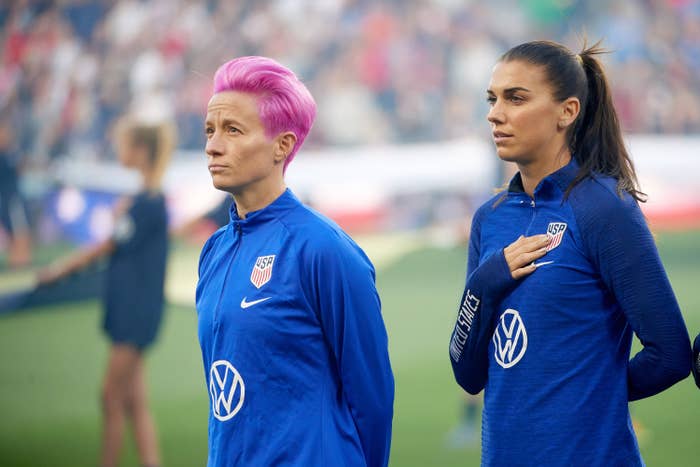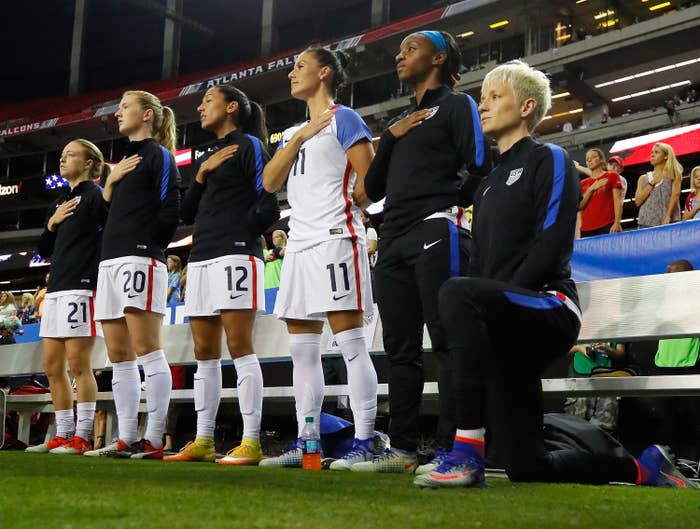Emails obtained by BuzzFeed News show that in 2017, US Soccer suggested a player who violated the policy twice could be suspended for a year.
Molly Hensley-Clancy BuzzFeed News Reporter
Posted on June 8, 2020

Ronald Martinez / Getty Images
Megan Rapinoe and Alex Morgan stand on the field during the national anthem before a friendly match at Allianz Field on Sept. 3, 2019, in St. Paul, Minnesota.
The US Women’s National Team is demanding their employer, US Soccer, end a policy requiring players to stand during the national anthem.
“The Federation should immediately repeal the ‘Anthem Policy,’ publish a statement acknowledging the policy was wrong when it was adopted, and issue an apology to our Black players and supporters,” the national team players said in a statement to BuzzFeed News.
Players called for US Soccer to “lay out its plans on how it will now support the message and movement that it tried to silence four years ago.”
US Soccer will hold a special board meeting Tuesday to discuss its anthem policy, which goes beyond even the National Football League’s rules in its attempts to limit players’ ability to protest. It requires players to “stand respectfully” during the anthem at national team games. When it passed in 2017, no board members voted against it.
The policy was created to target a single player: superstar Megan Rapinoe, who in 2016 became the first white major athlete to kneel during the anthem in solidarity with the NFL’s Colin Kaepernick.
Rapinoe, who is gay, said in 2016 that she was kneeling because she understood “what it means to look at the flag and not have it protect all of your liberties.”
“It’s important to have white people stand in support of people of color on this,” she said then.
No player actually faced penalties from US Soccer after the anthem policy, but emails obtained by BuzzFeed News show in 2017, US Soccer initially sought to punish any national team player who did not stand for the anthem with suspension.
“As to repercussions, what we have in mind is that for a first offense, the player be suspended for three (3) national team camps/games,” a US Soccer representative wrote to the player’s union of the men’s national team.
“For a second offense, the player would be suspended from participating in national team activities for twelve months.”
Both the unions for the men’s and women’s national teams said they believed the policy could never formally apply to national team players, because US Soccer had not gone through the proper process to approve the rule with the unions.
Nonetheless, the women's national team players said in their statement, the anthem policy “perpetuates the misconceptions and fear that clouded the true meaning and significance of Colin Kaepernick, Megan Rapinoe and other athletes taking a knee — that Black people in America have not been and continue to not be afforded the same liberties and freedoms as white people and that police brutality and systemic racism exist in this country.”
“This is everybody’s responsibility, including this union and its members; we could and should have done more in the past,” the players said. “We are committed to rising up against racist, hateful and unjust acts to effect change. Black lives matter.”
A representative for US Soccer declined to comment for this story.

Kevin C. Cox / Getty Image
Rapinoe kneels during the national anthem on Sept. 18, 2016, in Atlanta.
For Rapinoe, much of the damage had already been done by the time the policy was passed. After she said she would continue kneeling during the anthem, she was kept off of the US national team roster for more than six months.
Though she attended several team camps, Rapinoe didn’t put on the uniform of the national team — including to appear on the bench — until after US Soccer passed the policy requiring players to stand and she had agreed publicly to comply.
The team’s coach at the time, Jill Ellis, blamed Rapinoe’s absence from American rosters after she knelt on her performance: the midfielder had dealt with several injuries and struggled in the 2016 Olympics.
But details of the timeline of Rapinoe’s absence from the team undermine Ellis’s claim.
When Ellis left Rapinoe off the roster for the year’s biggest tournament in February 2017, for example, she said it was because Rapinoe needed “some time to work her way back in and get games with her club” in the National Women’s Soccer League.
But after US Soccer’s anthem policy was made public in early March, Ellis invited Rapinoe back into the team’s next training camp just two weeks later — long before she had played any games with her club team.
Rapinoe was invited to return to a national team camp on March 20, according to a source. She was put on the roster for the first time since she had knelt, and even played in both games, in early April against Russia. The first club games in the National Women’s Soccer League weren’t played until April 15.
And after she said she would stand for the anthem, Rapinoe made the next 26 national team rosters.
In a statement to BuzzFeed, the lawyer for the men’s national team union, Mark Levinstein, also called for the policy to be rescinded. He said it was an “ill-advised and insensitive political statement,” though he noted the union believed it had never applied to their players, "so we were not concerned about it."
“The Federation now absolutely needs to acknowledge they were wrong to issue it, to apologize for it, and rescind it,” Levinstein said.
Rapinoe has not given interviews in the wake of George Floyd being killed in police custody, saying she wants to focus on elevating the voices of black activists.
She has said previously that she believes she was kept off of the team because of her choice to kneel. But she has also pointed out that her career has been able to rebound — unlike Kaepernick’s, who has not played professional football again.
"While I'm enjoying all of this unprecedented and, frankly, a little bit uncomfortable attention and personal success, in large part due to my activism off the field, Colin Kaepernick is still effectively banned from the NFL for kneeling during the national anthem in protest of known and systematic police brutality against people of color, known and systematic racial injustice, known and systematic white supremacy,” Rapinoe said at an awards ceremony last year.
“I see no clearer example of that system being alive and well than me standing before you right now.”
Even if US Soccer’s board votes the anthem policy down Tuesday, it faces an uphill battle to being rescinded permanently. It must then go in front of the organization’s full membership, which is heavily white and male. The anthem policy passed without any objection in 2017.
During the 2019 World Cup, Rapinoe chose to stand stoically during the anthem, declining to put her hand on her heart or sing along as most of her teammates do.
“I’ll probably never put my hand over my heart,” she told Yahoo Sports. “I’ll probably never sing the national anthem again.”
MORE ON USWNT
US Women's Soccer Was Just Dealt A Huge Blow In Their Equal Pay Lawsuit
Stephanie K. Baer · May 1, 2020
US Women's Soccer Players Protested Unequal Pay At A Match By Turning Their Jerseys Inside Out
US Women's Soccer Players Protested Unequal Pay At A Match By Turning Their Jerseys Inside Out
Molly Hensley-Clancy · March 11, 2020

Molly Hensley-Clancy is a politics reporter for BuzzFeed News and is based in Washington, DC.

Molly Hensley-Clancy is a politics reporter for BuzzFeed News and is based in Washington, DC.
No comments:
Post a Comment